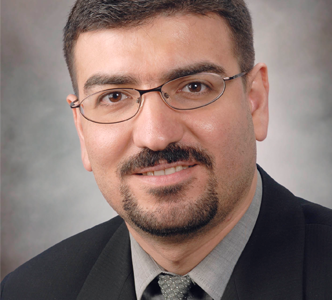Vascular & Interventional Radiology Residency Program
Congratulations on your decision to pursue a career in the field of Radiology; you have chosen a dynamic, challenging, and rewarding specialty. In no other area of contemporary medicine has the impact of technology been so great. Multislice CT scanners can freeze a beating heart, high field MRI allows diagnosis based on the chemical composition of tissues, and tumor-specific radionucleotides offer new ways to diagnose, monitor and even treat cancer. Nearly all aspects of medical practice depend on some sort of imaging today.
Integrated IR Residency: The integrated residency is an advanced five-year program that takes place after an ACGME-accredited PGY1 internship. There will be no detracting from the educational opportunities available to residents in the diagnostic radiology residency as the PGY2-PGY4 years are identical to the PGY2-PGY4 years of diagnostic radiology (DR) residency. As with diagnostic radiology, residents take the American Board of Radiology core exam at the end of the PGY4 year. The PGY5-PGY6 years are devoted to interventional radiology and include procedural rotations; however, It will be possible to do DR rotations to meet regulatory requirements during these years. UT Health’s Vascular & Interventional Radiology.
Independent IR Residency: The independent residency is a two-year program (PGY6-PGY7) that takes place after completion of DR residency. It includes the components of IR residency (procedural experience and patient care experience that includes ICU, inpatient service, consult service and outpatient clinic) that take place in the PGY6 years of the Independent program. The independent diagnostic residency experience may take place at an institution other than the one where the DR residency was completed.
Our goals and objectives (PDF download) are to provide you an opportunity to train with bright, enthusiastic colleagues in a friendly, supportive environment. To that end, we have assembled a faculty of experienced, talented, and dedicated sub-specialists who not only enjoy their work but are committed to teaching and to excellence in patient care. The training programs are designed to obtain maximum benefit from the large volume of clinical material and the broad range of pathology encountered at the well-equipped hospitals affiliated with the program. Our conference curriculum is well organized and is aimed at preparing residents for the core radiology.
Combine our focus on education with the many attractions and amenities of a large southwestern city with a year-round temperate climate, and you have the formula for a successful and enjoyable residency experience. We hope this website conveys a sense of the quality and convivial atmosphere of our department, and we look forward to receiving your application.
Associate Professor and Program Director, Interventional Radiology Residency Programs
Associate Program Director, Diagnostic Radiology Program
Dr. Kroma received his M.D. degree from Damascus University in Syria in 1994. He completed his residency in Diagnostic Radiology in 1997 at Damascus University. Dr. Kroma worked as a diagnostic radiologist in Syria and Saudi Arabia from 1997 to 2004. He then completed a Neuroradiology fellowship at Louisiana State University in 2005; followed by two years of Interventional Radiology fellowships at Louisiana State University and the Health San Antonio. He joined UT Health’s faculty in 2007. Dr. Kroma is certified by the American Board of Radiology for diagnostic radiology followed by a Certificate of Advanced Qualification in vascular interventional radiology (CAQ). His expertise include: Local treatment of liver cancers by radioembolization, chemoembolization and thermal ablation, local treatment of renal cancer by intra-arterial embolization and radiofrequency ablation, Uterine fibroid embolization, kyphoplasty and vertebroplasty , endovascular treatment of peripheral arterial disease, transjugular intrahepatic portosystemic shunts and balloon-assisted obliteration of gastric varices, management of post-liver and kidney transplantation complications, dialysis access maintenance, in addition to multiple percutaneous and endovascular procedures.
Contact Information
Ileana Villanueva
Program Coordinator
IR Integrated & IR Independent Residency
Phone: 210-567-5550
Fax: 210-567-5541
Email: villanuevai@uthscsa.edu

